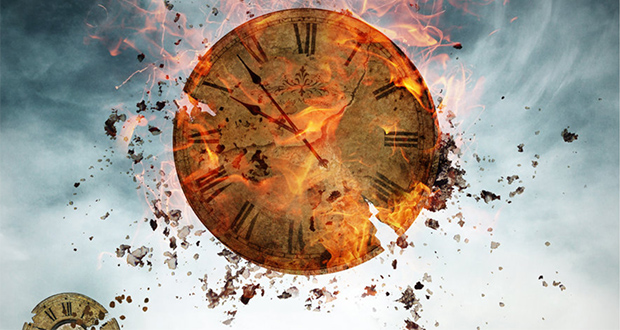Allāh says in the Qur’ān:
“By time. Indeed man is in loss. Except those who believe and do righteous good deeds, and recommend one another to the truth, and recommend one another to patience.”[1]
This Sūrah is undoubtedly well-known to many readers, for it is frequently recited in our prayers and is from amongst the shortest chapters of the Qur’ān. Despite its short length, if we ponder over its meanings, we will find many lessons and points of benefit that can be taken from it. Imām al-Shāfiʿī once commented the following about it: “Had Allāh not revealed anything except this Sūrah, it alone would have sufficed as it includes all knowledge required.”
Of the many points we can reflect over, one is found in the very first verse, in a matter of two words: “By time”. Of all that exists in the Heavens and the Earth, Allāh, in this verse, takes an oath by time. Have you ever wondered why? An oath is of little value unless it is made upon something of significant value or magnificence; so what weight is carried by time?
Simply put, time is amongst the greatest blessings from Allāh. The well-known proverb “Time is Money” completely belittles its true value as, in reality, it is far greater than that. Additionally, and worryingly, it is always diminishing, slipping away from our grasp. That which has passed can never be reclaimed. Conversely, we still have the opportunity to make the most of that which is ahead of us.
The Prophet (sall Allāhu ʿalayhi wa sallam) said:
“Make the most of five things before five others: life before death, health before sickness, free time before becoming busy, youth before old age, and wealth before poverty.”[2]
In another narration, our beloved Prophet (sall Allāhu ʿalayhi wa sallam) warns us that many of us are neglectful of this immense blessing from Allāh, saying:
“There are two blessings which many people do not make the most of and thus lose out: good health and free time.”[3]
We should all ask ourselves: how are we spending this commodity which is so great that Allāh, the King of kings, takes an oath by it? Are we amongst those who the Prophet (sall Allāhu ʿalayhi wa sallam) warned would lose out, or do we give time its right?
The average life expectancy in the UK is currently just below 82 years. It may seem like we have ample time to build up a reasonable amount of good deeds. But then, let us break this down further: we consider the first 16 years or so as childhood; roughly 20 years are spent in sleep. On top of this, we spend many hours a day at work or commuting, as well as occupied by menial tasks such as eating and cleaning; all of which adds up to another number of years.
Stepping further back, we know that generations upon generations have been lain in their graves for centuries, and when we are finally resurrected, the Day of Judgement will last 50,000 years before we are entered into our final, eternal abodes. With this shift in perspective, our time in this world is truly short and can not be wasted; particularly as it will determine what comes next.
This temporary nature is made abundantly clear in another ḥadīth. The Prophet (sall Allāhu ʿalayhi wa sallam) said:
“The most privileged people in the world from the people of the Hellfire will come on the Day of Resurrection to be dipped in the Hellfire, then it will be said: O son of Ādam, did you see any good? Did you get any blessing? He will say: No, by Allāh, my Lord!
Then the most miserable people in the world from the people of Paradise will come on the Day of Resurrection to be dipped in the Paradise, then it will be said: O son of Ādam, did you see any hardship? Did you have any distress? He will say: No, by Allāh, my Lord! I did not once see hardship or distress.”[4]
This is the reality of our existence in this world. A fraction of a moment in the Hereafter, and the Dunya is entirely forgotten. As such, we must dedicate our time to pursuing success in the Hereafter and we should all aspire to be productive and pro-active in seeking out opportunities to please our Lord. Muslims, by virtue of the fact that we know and understand this life is temporary, should be the most productive of people – in all aspects of life.
Of course, the hustle and bustle of life in the West can often drain energy, and many of us struggle to make ends meet, even with long shifts. Therefore it is only natural that we need rest and relaxation too. But Allāh is al-Karīm – we can attain reward for any halāl act, including relaxing and sleeping, depending on our intention, as will be discussed briefly below.
Let us now look at some practical realities and potential solutions to make better use of our time.
Firstly, if we find ourselves engaging in sin, whatever it may be, let us find permissible alternatives as quickly as possible, so as to not make time something that counts against us. And we must remember, we will not only be accountable for how we spend our time, but where we spend it too; sitting in a place disliked by Allāh even if we are not knowingly engaging in a specific sin at that moment is risky business indeed – perhaps something those working in the West need to be particularly cautious of when invited to drinks with their colleagues.
If we are blessed enough to look after the obligatory acts and make effort to stay away from sin, then let us seek to increase in good actions and intentions – for we rarely stand still; we know that the minimum Shayṭān will try to get us to do is to leave a good act for a less good one, or for a sin, and will continuously try to do so. We counter him by the opposite, continuously finding ways to maximise reward in our time and actions.
Those who are busy in their day-to-day lives must remember that Allāh can bless and increase our time if we strive to use it wisely. Simple ways in which we can add to our scale of good deeds inshāAllāh are:
⌛ Regular remembrance of Allāh and His blessings upon us, istighfār (seeking forgiveness), and sending salutations upon our Prophet (sall Allāhu ʿalayhi wa sallam) – these utterances of the tongue can be done at almost any time, whether we are at work or during idle time such as when commuting, and are very heavy on our scale of good deeds.
⌛ Increase in time spent on the Qur’ān – in its recitation, its memorisation, and of course in its reflection. No matter how busy we are, there must be a set, allocated time for our daily portion of the Qur’ān; and this is not a burden at all, but rather a source of guidance, peace, contentment and even relaxation.
⌛ Avoid excessive sleep – reducing sleep by just half an hour per night equates to nearly 8 entire extra days in the year. That is, 8 clear days – not days where one goes to work or sleeps at night, or is busy on other matters – but entirely empty days to make the most of in good deeds, time with the Qur’ān, visiting relatives and the sick, charity work, and so on.
⌛ Sleep with the intention of acquiring rest in order to spend the next day engaged in productive work, in earning provision, or waking up for qiyām or fasting, etc. This way, we will attain reward and make those years we seemingly lose on sleep count as something great on our scale of good deeds.
⌛ Remember that by intending some goodness in any action, Allāh will reward us for that time. Going to work could be done with the intention of earning a halāl provision for one’s family and to spend in charity. Spending time with one’s family could be done with the intention of strengthening the ties of kinship. Meeting friends can be done with the intention of increasing brotherhood and giving da’wah. There are countless examples, but the key is to genuinely intend something pleasing to our Creator and to remember this intention during the act as well.
⌛ Be pro-active in managing time at work. During the winter months, many have to pray Dhuhr, ʿAsr and Maghrib during working hours and could struggle to avoid clashing meetings or feel awkward to have to “interrupt” their work each day. We all know that our salāh is our greatest priority. Therefore, we should ensure that we have an established routine that our colleagues are well-aware of. Likewise, taking a shorter lunch break is important to be confident that we have not taken more than we are entitled to from our employers in terms of breaks.
⌛ Consider the time we spend travelling for some worldly benefit and assess whether there is a better alternative that will benefit our Ākhirah instead (or in addition to). Perhaps we would be willing to travel to a shop further away in order to save some money, but is that money saved worth the time lost? Unless it is done out of necessity, we should certainly give it thought. Spending that same time with the Qur’ān, seeking knowledge or volunteering, will aid us on the Day of Judgement, whereas those savings, if not a necessity, are not likely to be of any use – unless it was to give in charity.
⌛ Lastly, consider the time we currently spend on our phones, on Facebook, YouTube, or watching TV. How many of us find time to watch hours of TV every week yet struggle to find time to learn Qur’ān or seek knowledge? Although there are some benefits in all of these forms of media, we should ask ourselves what portion of our time on any of these is actually on beneficial matters? We will find that we are too-easily wasting time and potentially sinning by delving into that which does not concern us.
These are just some of the many steps that we can take to make better use of our time inshāAllāh. We pray that Allāh enables us to attain His pleasure through every moment of life He blesses us with. Amīn.
[donationbanner]
Source: www.islam21c.com
Notes:
[1] Al-Qur’ān, 103
[2] Narrated by Ibn ʿAbbās and reported by Al-Hakim
[3] Narrated by al-Bukhārī
[4] Narrated by Muslim









